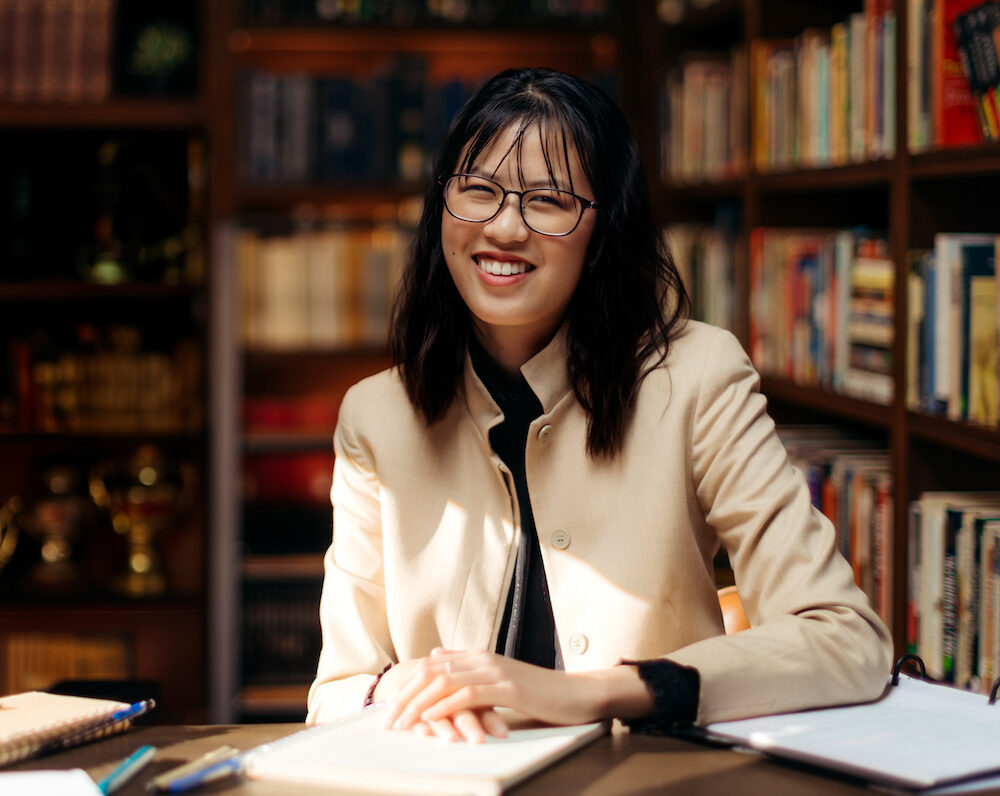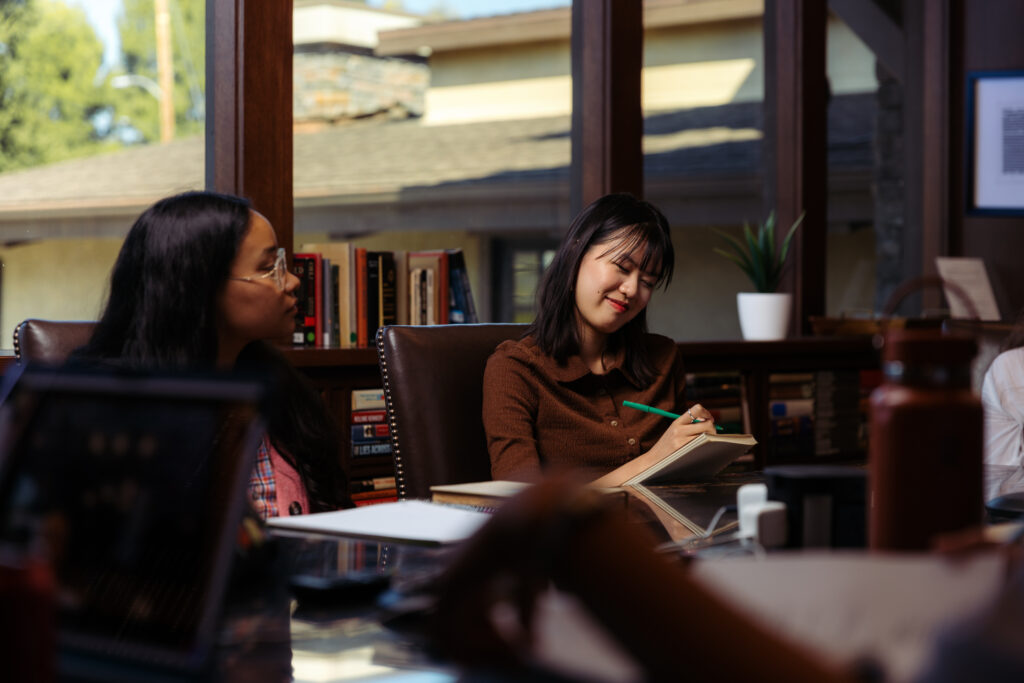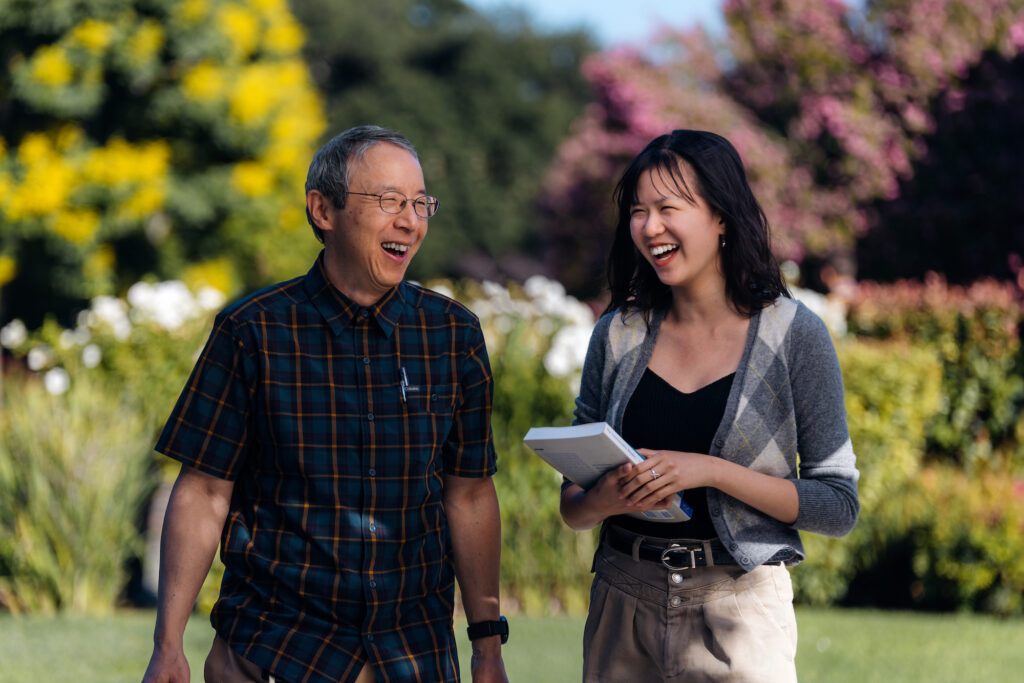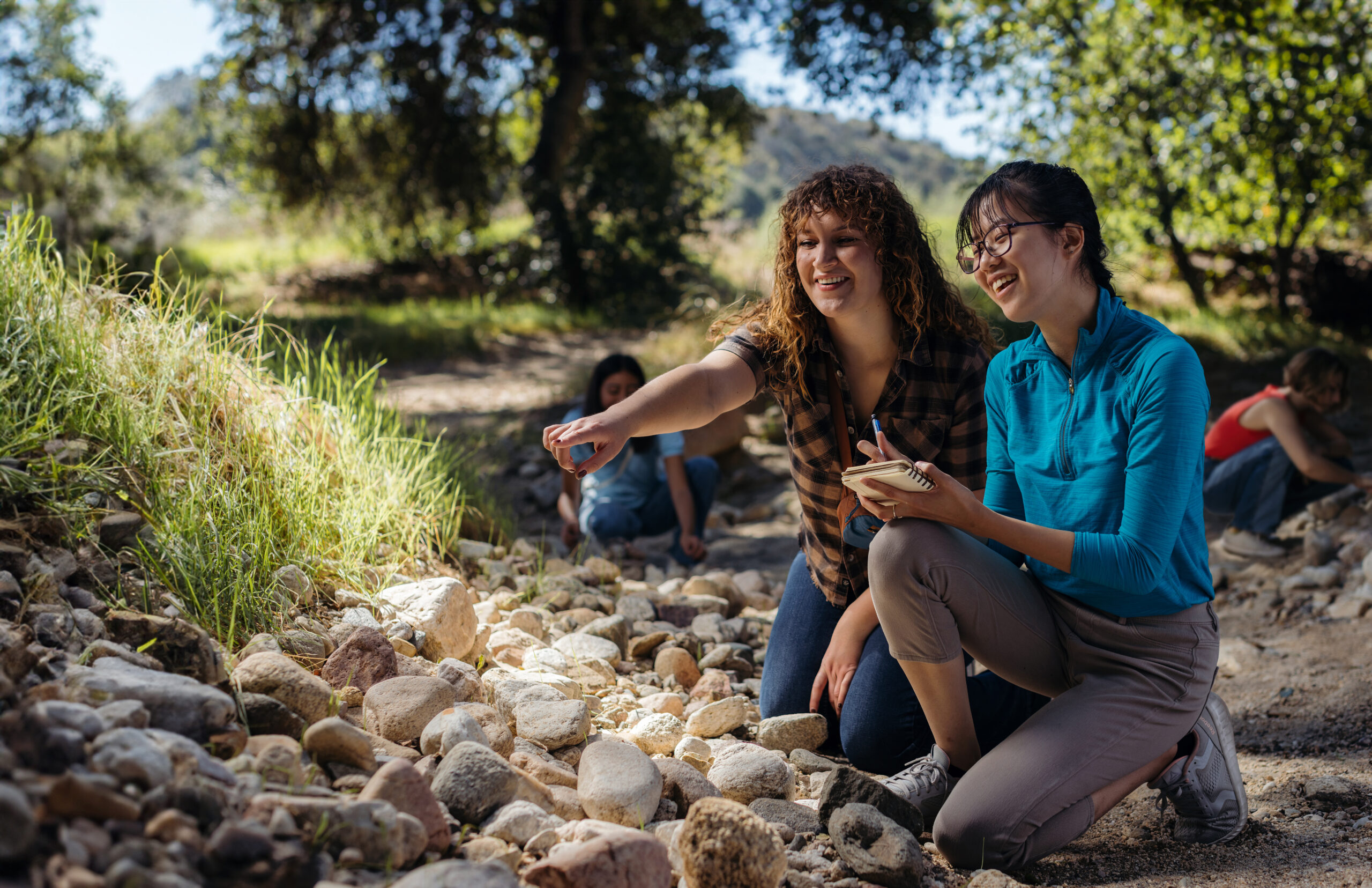Senior Josephine Lee reflects on an educational journey she never could have predicted.

Lee says an interdisciplinary education has prepared her to pursue a future in research and writing. Photo by Mark Finster
Editor’s Note: Josephine Lee is a senior at TMU double-majoring in communication and interdisciplinary studies (in English and geoscience). Lee is an international student from Malaysia and the daughter of a missionary who graduated from The Master’s Seminary. She has been able to attend TMU in part through the assistance of The Master’s Global Scholarship.
In 2018, my dream school was a liberal arts college in New York City. What made it so attractive was not anything the director of admissions had to say. Instead, it was the glossy aura about the school: metropolitan, transformative, creative. This place, it seemed to say, prepared you to contribute to society in a capital-C kind of way.
The appeal of such a place was not lost on me. I’d spent my formative years in a classical Christian school characterized by long class discussions on thought-provoking topics accompanied by equally long essays. My time there engrained in me a love for learning and the eagerness to Do Great Things.
As the daughter of a Master’s Seminary graduate, I felt like The Master’s University was always on the horizon, and thus almost too familiar. I thought the life-changing experience I needed and the ambitious person I wanted to become would best be uncovered in a place like New York. Despite my desires, a combination of generous scholarships and parental guidance ultimately guided me away from the East Coast to TMU in Southern California.
I was thankful for the open doors, but in the back of my mind there was a niggling doubt that I’d missed out on something big by trading my aspirations for some much-needed practicality.
I’m happy to report that I was wrong.

Lee has taken advantage of class offerings across different departments, from business to Bible. Photo by Mark Finster
In today’s society, education is seen as the norm — and sometimes the necessary evil — that grants access to the essentials of life in the 21st century: a fulfilling career, financial stability, and a good retirement plan. And so it’s tempting to think about college in the most pragmatic of terms — the fastest degree, for the biggest return on investment.
As a result, humanities degrees have become a luxury, to be avoided by the sensible in favor of tracks that are seemingly more job relevant. Meanwhile, accelerated programs and college alternatives are proliferating. Contemporary wisdom says, if you’re going to expend four-plus years and thousands of dollars on schooling, you’d better choose the biggest, quickest launchpad to a fruitful career.
As a student at a liberal arts school, I fully understand these sentiments. I’ve heard the fears that what we’re studying might just be useless. I’ve been warned about my dwindling opportunities in an increasingly competitive job market. And, I’ll admit, I’ve debated switching majors for practicality’s sake.
But from my rich experience here, I’ve also realized that when we see college only as a pit stop to the real world, we’re in danger of missing out on some incredible things.
I want to argue that for the 16 million Americans who are still choosing college in 2023, it’s time to demand more from our education. This means freeing ourselves from the limiting notion that success is just a good salary at a good job. It means becoming more ambitious – not with earning money, but with learning what we love. It means trading “Is this degree going to take me where I want to go?” for “Will it make me the person I want to become?”
Allowing ourselves a broader perspective on education may be uncomfortable, uncertain, and at times downright scary. But it may just be life-changing. After all, when you choose the byroads over the highway, you get to smell the roses.

Getting to know faculty members like Prof. Jo Suzuki has been a highlight of Lee’s time at TMU, she says. Photo by Mark Finster
When I enrolled at TMU, I chose to be a communication major — not even knowing totally what communication entailed, just that it was something I could enjoy doing in the long-term. I put my other passions on the backburner, thinking I’d revive them someday.
In 2020, I was unable to leave my home country of Malaysia, and my admissions counselor, in the throes of coordinating my virtual class schedule, found a narrow window of communication electives that aligned with my time zone. Among them were two classes with Dr. Julie Larson.
If I had known a little more about Dr. Larson’s challenging workload, perhaps I would have signed up for a lighter class. But, blissful freshman that I was, I registered for both.
That semester, I was locked in an intense battle with my schoolwork virtually around the clock. But in the process, I learned for the first time how to conduct textual analysis and run a research project. At Dr. Larson’s suggestion, I began to consider graduate school. I’d found the theoretical, rhetorical side of communication, one that scratched my itch to think and write in a new way.
I arrived at TMU, finally in-person, in the fall of 2021. I was confident in my chosen degree and excited for the new aspects of communication I would discover. But the discoveries I made in the next few semesters were not ones I could have anticipated.
It was my high school friend — and first college roommate — who sparked the first of many adventures. As communication majors, we had the option to take a few interesting-sounding English classes as electives. My friend had picked out a course taught by Prof. Jo Suzuki. I decided to join her.
What began as an opportunity to take something “for fun” eventually altered the trajectory of my college years. That class with Prof. Suzuki introduced me to the possibility of examining literary and critical theory from the foundation of the Bible. Grappling with these subjects, once so abstract and foreign to me, has become a tangible expression of my faith.
The next semester, I almost chose a seemingly more relevant course over Prof. Suzuki’s study of feminist criticism. But my roommate again pushed me. “I can’t think of a single class you’d enjoy more,” she said.
She was right. That semester I had to face hard questions and refuse simple answers. As we developed a biblical conception of femininity, I knew that what I was learning was not only giving me a new passion for academics but strengthening my understanding of Scripture.
At the end of that semester, I found myself in the office of Prof. Esther Chua, chair of the Department of Arts and Letters, asking if there was a way I could add an English major to my degree plan.
At the time, I couldn’t quite swing the requirements, but I couldn’t shake the desire to get more of what I was learning. Early the next semester, in whispered conversation in the back of the library, another friend persuaded me to look into a new program TMU had just designed. At first, knowing that she was a triple-major and therefore certifiably crazy, I brushed the idea aside.
But later that week I was back in Prof. Chua’s office, this time to ask about the interdisciplinary studies major.

Lee’s interdisciplinary major includes English and geoscience. Photo by Mark Finster
I was swimming in all the possibilities of changing my degree, adding majors, wrangling with their respective consequences on my approaching future, when Prof. Chua looked at me and bluntly asked, “You’ve got to ask yourself, is this worth it?”
She wasn’t asking, is it worth it for your career? Your next job? She was asking if it was worth it to me.
It’s a question I’ve pondered several times when I debated if it was worth taking courses for no credit, studying seemingly irrelevant subjects, putting an extra semester into the classroom that I could have spent entering the workforce. But again and again, the push of encouraging advisors, intellectual peers who became friends, professors passionate about noir films and dinosaurs and storytelling, has led me to the same answer: Yes.
I’ve realized that the practicality of my classes wasn’t limited to their checkbox on my degree sheet, but in their capacity for developing me into the person I want to become. When I stopped educating myself only for the sake of meeting a requirement, I was freed to learn anything I found valuable, from how to analyze a Maupassant story to how to evaluate the stock market.
We sometimes forget the simple magic about universities — that for a few years, you can learn almost anything you want. But if that freedom is also causing you to waver before those crisis-evoking, “What do I want to do for the rest of my life?” questions, here’s my fundamental piece of advice: Learn into the person you want to be.
If you want to be smart, choose a major that drives you to your mental limits. If you want to be a kinder, more thoughtful person, take courses that teach you interpersonal skills. If you want to know Jesus more deeply, find a school that will tell you what the Bible really says. Know who you want to become, and your academic choices will follow.
I’m fortunate to have found a home for my interdisciplinary passions in TMU. Between communication, English, and geoscience, my degree combination may sound like a bad recipe for an ambiguous future. But what I’m really graduating with is a hard-earned confidence in my faith, the ability to engage with critical cultural issues, a passion for the wise stewardship of nature, and a desire to creatively communicate these ideas. I’m excited to pursue graduate studies, where I’ll get to dive deeper into some of the very subjects I previously thought I was checking at the door.
By the way, that dream school of mine? I heard recently that it’s closing. But that’s alright. Turns out, you don’t need New York City to broaden your horizons or make capital-C contributions. TMU gave me the opportunity to develop in my entire person — both intellectually and spiritually. And that’s all I need in order to be prepared for whatever God has next.
Learn more about TMU’s interdisciplinary studies program, here.

The Master’s University and Seminary admit students of any race, color, national and ethnic origin to all the rights, privileges, programs, and activities generally accorded or made available to students at the school. It does not discriminate on the basis of race, color, national and ethnic origin in the administration of its educational policies, admissions policies, scholarship and loan programs, and athletic and other school-administered programs.
21726 Placerita Canyon Road
Santa Clarita, CA 91321
1-800-568-6248
© 2025 The Master’s University Privacy Policy Copyright Info
| Cookie | Duration | Description |
|---|---|---|
| cookielawinfo-checkbox-analytics | 11 months | This cookie is set by GDPR Cookie Consent plugin. The cookie is used to store the user consent for the cookies in the category "Analytics". |
| cookielawinfo-checkbox-functional | 11 months | The cookie is set by GDPR cookie consent to record the user consent for the cookies in the category "Functional". |
| cookielawinfo-checkbox-necessary | 11 months | This cookie is set by GDPR Cookie Consent plugin. The cookies is used to store the user consent for the cookies in the category "Necessary". |
| cookielawinfo-checkbox-others | 11 months | This cookie is set by GDPR Cookie Consent plugin. The cookie is used to store the user consent for the cookies in the category "Other. |
| cookielawinfo-checkbox-performance | 11 months | This cookie is set by GDPR Cookie Consent plugin. The cookie is used to store the user consent for the cookies in the category "Performance". |
| viewed_cookie_policy | 11 months | The cookie is set by the GDPR Cookie Consent plugin and is used to store whether or not user has consented to the use of cookies. It does not store any personal data. |
Notifications
